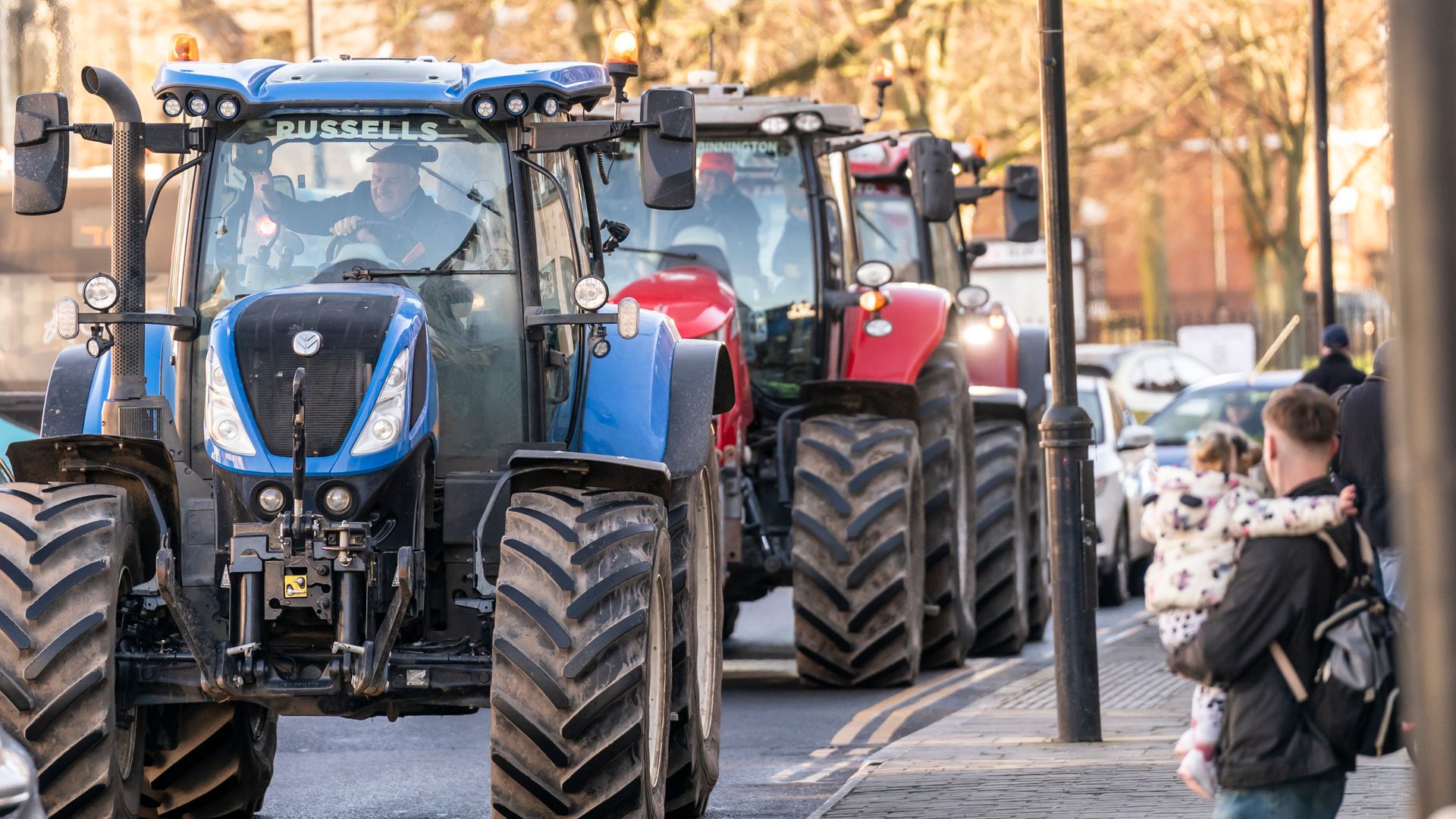Farmers angry at the government’s inheritance tax reforms have been protesting in town centres across the UK using their tractors as part of a so-called National Day of Unity.
The Treasury estimates the changes, revealed in last October’s budget, will raise up to £520m a year. Farmers and campaigners say they threaten the future of thousands of multi-generational family farms and would “decimate” the country’s agricultural sector.
People brought their food, tractors and livestock to the protests which took place in all four UK nations.
The series of events on Saturday was organised by the National Farmers Union (NFU).
A day earlier in Downing Street, NFU president Tom Bradshaw and NFU Cymru president Aled Jones handed in a petition signed by more than 270,000 members of the public calling on ministers to ditch the “devastating family farm tax”.
Last month, Mr Bradshaw told Sky News that he cannot rule out food shortages if farmers go on strike.
Saturday’s events, in places including Cambridge, Warwick and Selby in North Yorkshire, were about “visibility”, according to an NFU spokesperson.
They said: “It’s about going out to the public in the town centres and thanking them for their support, encouraging them to keep supporting farming. The visibility is about a reminder that the problem is still there.”
They added: “We want the chance to meet and discuss, and review the decisions that she [Chancellor Rachel Reeves] has made.”
Since 1984, farmers and agricultural land and business owners have been exempt from IHT, thanks to a series of tax “reliefs” that can be applied to estates.
There are two broad categories, both offering 100% relief.
Agricultural Property Relief (APR), covers land and farm buildings, and Business Property Relief (BPR) applies to livestock, machinery such as tractors and combine harvesters, and assets developed to diversify income, such as cottages converted to short-term lets, or farm shops.
From 2026 those 100% reliefs will end, replaced by limited relief for farmers on more generous terms than general IHT.
Estates will receive relief of £1m, with up to £500,000 of additional relief, as with non-farming estates. If a farm is jointly-owned by a couple in a marriage or civil partnership, the relief doubles from £1.5m to £3m.
Any tax owed beyond the level of relief will be charged at 20%, half the standard 40%. If farms are gifted to family members at least seven years before death no IHT is payable.
‘Raising awareness’
Rachel Hallos, a livestock farmer from the South Pennines, said she hoped the events would “raise awareness” of the impact of the planned reforms to inheritance tax for farming businesses, and lead to the government reviewing its decision.
Speaking on her way to an event in Chester, NFU vice president Ms Hallos said: “The inheritance tax changes from the budget will ultimately decimate what we’ve currently got in this country, and we’re really worried about it.”
She continued: “Food and environment just doesn’t seem to be important to this government.”
Read more:
What’s the beef with farmers’ inheritance tax?
Environment secretary apologises to farmers for tax ‘shock’
Seven protest runs took place across all six counties in Northern Ireland, organised by the Ulster Farmers Union (UFU), including two in Co Down.
Lines of tractors were driven to the site of the former Maze Prison to take part in the two Co Down routes, many displaying posters that read Save Our Family Farms and UFU flags.
‘More nature-positive ways of farming’
Environment Secretary Steve Reed told the Fabian Society’s new year conference that in recent decades nature and food production have been “in opposition to each other”.
He added that “a healthy natural environment is essential to food production. So we will work with farmers as they transition to more nature-positive ways of farming”.
Follow our channel and never miss an update.
A spokesperson for the government said as part of its “steadfast” commitment to farmers, it will invest £5bn in farming over the next two years which was “the largest budget for sustainable food production in our country’s history”.
They added: “We are going further with reforms to boost profits for farmers by backing British produce and reforming planning rules on farms to support food production.
“Our reform to Agricultural and Business Property Relief will mean estates will pay a reduced effective inheritance tax rate of 20%, rather than standard 40%, and payments can be spread over 10 years, interest-free.
“This is a fair and balanced approach, which fixes the public services we all rely on, affecting around 500 estates a year.”





